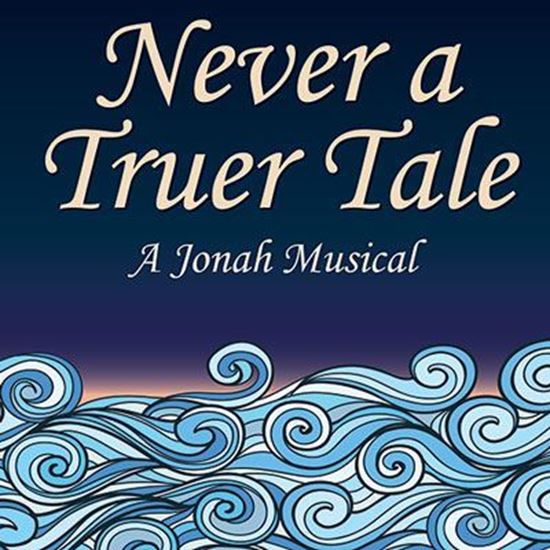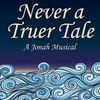










Never a Truer Tale - A Jonah Musical
“Never a Truer Tale - A Jonah Musical” follows the Biblical prophet Jonah as she washes up on shore and meets three friends: Athena, an eternal skeptic; Agnes, an indecisive fence-sitter; and Theo, a true believer in… pretty much everything. Jonah begins to tell her story to the trio, explaining that she was called by God to preach to Nineveh, the city at the center of an empire known for conquest and cruelty, but that she chose to run away instead. The trio adds quips and commentary as she tells of boarding a ship, running into a storm, being thrown overboard by the sailors, swallowed by a giant fish (or was it a whale?), and spit back out on land. Along the way they debate the veracity of her tale and the nature of belief, faith, and skepticism. Jonah finally accepts the action of her calling but continues to struggle with the heart of the message. She arrives at last in Nineveh only to give a half-hearted sermon –well actually, it’s just one line. The finale culminates in Jonah having a debate with God that essentially asks, "Who deserves forgiveness?"
The musical uses area staging, stress-free set pieces (arranged by humorous set movers), minimal costuming and ten easy and engaging songs. The gender designations in the script are based purely on voice parts (where applicable) and reflect the casting of the original production. Any role may be played by any actor who can sing the part. About 30 minutes.
Productions
Behind The Scenes
With Ellie Cook, Jason Cook, and Kai Cook
What inspired you to write this musical?
(Jason) I have to credit my sister Ellie for the first spark. She told me she had an idea for doing a version of Jonah that's a more complete rendition than we typically hear. Most of us learn about Jonah when we're kids. We hear about the fish, and that's mostly it. The stuff that comes before and after are really what gives the fish context, and in my mind, the end is far more interesting than the rest of it.
The old fish story we barely learned about as kids turns out to have an ending far more profound than most of us realized. But that gave us a particularly interesting direction to take it in: a musical that starts off light and fun, like we're hearing the kid story, but that ends on a darker note, one that's truer to the source material. Sort of a scale model of that process of taking for granted a simple Bible story as kids, and then discovering its deeper elements later in life.
The title of the show then has multiple relevancies to it. On the one hand, it can feel like it's tongue-in-cheek at the start of the show, and sure, it kind of is. But it's also sincere in that our aim was to embed a more complete telling of the story. It's a show that seeks to set the record straight by the end. And thus you get "The True Story of Jonah." Ya know, sort of.
(Ellie) I first learned of the ending of the book of Jonah when I was in Bible college. I'd never been taught that part in all my years of growing up in church. Years later I said to my brother, who I had done some writing with before, that I thought Jonah might make a good musical. He wasn't so sure, until I told him how the book actually ends. He said, "...Ooo, that's interesting..." We pitched it to my daughter, who we wanted to collaborate with, and she liked the idea as well. From there it sort of took on a life of its own.
What's your favorite part or line in the musical? Why?
(Jason) I tend to be the one to inject jokes into things, but as happy as I am with the humor in the show, my favorite part has to be Jonah's solo on the boat. The music and mayhem almost completely drops out, and all we're left with is an incredibly moving expression of her faith. It's a confession, like an admission of guilt, and therefore it's a moment of sincere vulnerability. Jonah's finally admitting, "This is who I actually am, and who I am has an impact on the world around me."
That's the kind of personal reckoning we all have to face sooner or later. I don't care who you are, where you come from, or what you believe, I challenge anyone to not feel for her in that moment. Up until then, it's all kind of fun and games for us in the audience. For me, that's the first point in the show that makes you stop and go, "Oh. Wow."
(Ellie) For me it's got to be that line of Jonah's in the finale, the angry and bitter version of "I worship the Lord, the God of heaven, but if you made the sea and the land, then why can you not understand that I can't -- why me?" because it's so honest. We've all had those times when following our calling feels impossible or unfair. We've all felt like giving up, or like we're being expected to do too much. I definitely had my own struggles in mind when I wrote those lyrics. I think recognizing those feelings and honoring them is important.
(Kai) The finale. A lot of church productions feel the need to answer every question, and I think there's a level of credit that our show gives the audience by not needing to hold their hand. The ambiguity of the ending sparks interesting conversation, rather than telling you exactly what to think. I like the fact that different people can feel different things about it.
Where did the characters come from? Are they based on people you know?
(Jason) The trio is really everyone we know. We all know Theos, and Athenas, and Agneses. Here in reality, we're more than characters, we're three-dimensional human beings, so we have a little bit of all three in us, and each one comes out depending on the story we're being told.
That's why we made a point never to "slam dunk" on any single member of the trio. All three of them get to present their best and worst arguments, and the individuals in the audience decide who to root for.
The trio can debate all day over what's going on "outside the fish" (or whale?)--ie. outside our own experiences--but Jonah shows us that there's always something, whatever it actually is, going on inside of everybody, and that's our "in" for going along with her journey. In that way, the trio's ongoing debate enriches her journey for us without getting in the way of it. At the end of it all, just like reality, we're often left with many difficult questions and few easy answers.
(Ellie) The Trio are meant to be archetypes of different positions in a disagreement, and the way the three of them debate is not that far off from how the three of us were while working on this show. Not the exact positions of the characters (no one's worldview is that black and white), but examining questions or problems from different angles. Although I would like to think we're better at listening to each other!
What did you try to achieve with this musical?
(Jason) There's been some debate among Biblical scholars as to whether the book of Jonah was meant to be a parable or a historical account. While the consensus today is that it's a parable, the history of this debate gave us the opportunity to use Jonah as a means to tell a story about the nature of truth and how we approach it. That kind of thing always seems to feel especially relevant "these days," but I see it as relevant always and to everyone. At what point does the historical accuracy of a story diminish its value as a tool to communicate ideas?
Art is by its very nature a subjective exercise in exploring our personal values, so for me it felt very special to stumble upon an idea that allowed us to grapple with the nature of how we reconcile our subjective experience with objective truth, when those two things sometimes feel at odds. Then we tried to sneak all of that inside the Trojan horse of a fun and funny musical that looks and feels more like a fairy tale than a serious period piece. Because of that, I feel especially fortunate in our finding that the show manages to present a meaningful and engaging story with something to ponder for anyone, regardless of their faith.
(Ellie) The thing we talked about the most was asking interesting and important questions without imposing our own answers. We wanted to get people thinking and then leave room for them to draw their own conclusions. We felt strongly about trusting the audience enough to take the ideas we presented to them, and letting them decide what to do with them. It seems we were successful, as so many audience members have told us that they liked the show because it was thought provoking.
Do you have anything else you'd like to add?
(Jason) Every artistic endeavor is a dare with yourself. That dare is to say yes to the question, "Do I have something to say?" We dared to say yes. Of course you want art to entertain. That said, when something only entertains, you have your fun in the moment, but you don't necessarily go on to remember it. I hope that the show entertains you, but it's a show with something to say, so I especially hope that it's a show that you'll remember.
(Ellie) In the spirit of the way we wrote the show, I get excited when I think about our work being performed by a different group, and what new insights and creative ideas a different set of minds will bring to it. We created the show, now we're releasing it into the wild to see where it goes and what it does on its own.
